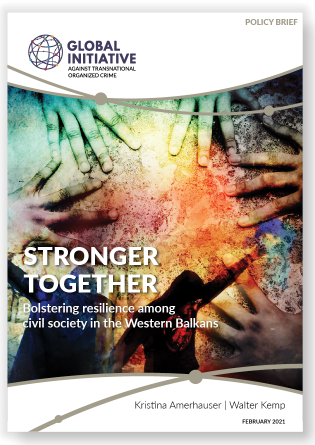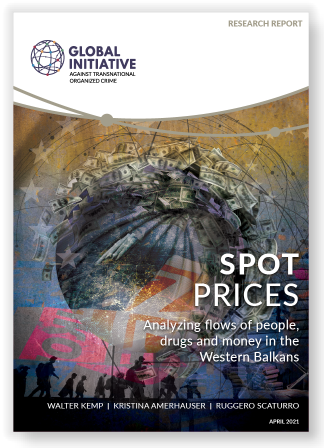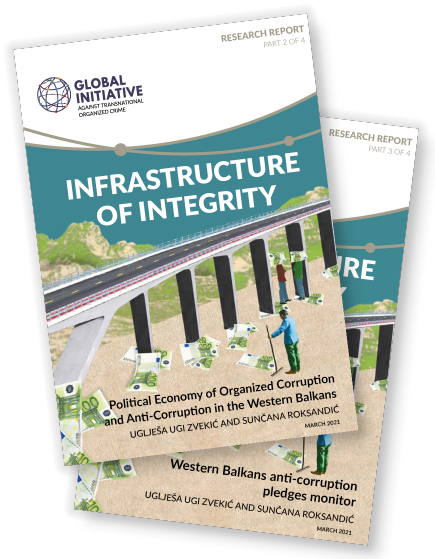Publications at a glance
In this new feature, we list a number of recent publications related to organized crime and corruption in the Western Balkans and showcase several new reports by the GI-TOC.
| Saša Djordjević and Bojan Dobovšek, Organised crime in Western Balkans Six at the onset of coronavirus, International Journal of Sociology and Social Policy, 40, 9/10, 807–820. | This paper looks at the impact of COVID-19 on fighting organized crime in the Western Balkans and provides an overview of the criminal landscapes in the WB6 at the beginning of the pandemic crisis. |
| Tena Prelec, The United Arab Emirates profile themselves as a new global hub for money laundering, with implications for the Balkans, IEMed. Mediterranean Yearbook 2020. Barcelona: IEMed, 2020, 197–200. | This work looks at how relations between the United Arab Emirates and countries of south-eastern Europe have been improved by a boom in investments and ‘sweet loans’, starting with Montenegro and then moving into Serbia and other countries. |
| Christina Griessler, The Berlin Process. Bringing the Western Balkan region closer to the European Union, Südosteuropa, 68, 1, 1–24. | This paper examines the documentation of the Berlin Process and shows that although proactive measures have been taken, such efforts have not been successful in enabling the Western Balkans to implement the reforms required for EU accession. |
| Vedran Recher, Illegal tobacco demand: The case of Western Balkan, Economic Analysis and Policy, 66, 182–193. | This paper investigates tobacco smuggling in the Western Balkans. Data are used to explore smoking habits and attitudes about the illicit market. |
| Elena Krsmanović, ‘Crimen et circenses: Serbian turbo folk music and organised crime’, in eds. D Siegel and F Bovenkerk, Crime and Music, Springer, Cham, 149–167. | This chapter critically explores the vibrant, carnivalesque Serbian turbo folk scene and its links to organized crime. |
| Megan Duffy and Samuel Green, Organised Chaos: Russian influence and the state of disinformation in the Western Balkans, Murrow Center For a Digital World, Special Papers Series, Fall 2020. | This research analyzes disinformation sources and trends in the Western Balkans and examines how the local context allows disinformation to permeate the information space. |
| Iztok Prezelj and Nina Otorepec Vogrinčič, Criminal and networked state capture in the Western Balkans: the case of the Zemun clan, Southeast European and Black Sea Studies, 20, 4, 547–570. | This paper argues that the Western Balkans face the problem of networked state capture based on a corrupt nexus among organized crime, business, politics, security services and the judiciary. |
| Jovanka Kuvekalović-Stamatović and Marko Filijović, Illegal logging as a threat to human security in the Western Balkans, Journal of European and Balkan Perspectives, 3, 2, 72–93. | In this paper, the authors analyze the problem of illegal logging in the Western Balkans. The main hypothesis is that the destructive exploitation of forests represents a threat to human security in the region. |
| Nieves Zúñiga, Examining state capture: Undue influence on law-making and the judiciary in the Western Balkans and Turkey, Transparency International, December 2020. | This report examines two key enabling factors of state capture in the Western Balkans and Turkey: impunity for high-level corruption and tailor-made laws. |
| Agon Maliqi, Transition to what? Western Balkans democracies in a state of illiberal equilibrium, Sbunker, November 2020. | This paper attempts to understand EU accession in a multidimensional fashion and to suggest potential avenues for future engagement by local and global advocates of democracy. |
| UNODC, Measuring organized crime in the Western Balkans, UNODC Crime Research Section, 2020. | The findings of this report are based on a statistical and analytical framework to measure and assess organized crime in the Western Balkans. |
| The Siracusa International Institute of Criminal Justice and Human Rights, Closing the implementation gap: Criminal justice responses to illicit trade in South Eastern Europe and associated challenges, 2020. | This report explores the shortfall between existing legal, policy and institutional frameworks in South Eastern Europe countries, and their practical application in the fight against illicit trade. |
| Andi Hoxhaj, The EU rule of law initiative towards the Western Balkans, Hague Journal on the Rule of Law, 2020. | This article looks at the EU’s enlargement policy developments in 2018–2020, examining how the EU is using its new enlargement policy package to promote the rule of law in the Western Balkans. |
| Andi Hoxhaj, The EU Anti-Corruption Report, a Reflexive Governance Approach, Routledge, 2019. | This book analyzes the development of anti-corruption as a policy field in the EU, with a particular focus on the EU Anti-Corruption Report. |
New and forthcoming GI-TOC publications



Stronger together: Bolstering resilience among civil society in the Western Balkans.
Kristina Amerhauser and Walter Kemp
As the space for civil society appears to be shrinking in the Western Balkans, this report looks at organized crime and corruption in the region from a civil society perspective. It aims to give an overview of how civil society organizations in the Western Balkans deal with issues related to organized crime and corruption and highlights their main activities and concerns.
Spot prices: Analyzing flows of people, drugs and money in the Western Balkans.
Walter Kemp, Kristina Amerhauser and Ruggero Scaturro
This third report in the GI-TOC’s Western Balkans hotspots series looks at the flow of people, drugs and money through the region including a detailed analysis of smuggling routes and prices as well as places and sectors vulnerable to money laundering.
Political economy of organized corruption and anti-corruption in the Western Balkans. Western Balkans anti-corruption pledges monitor.
Uglješa Ugi Zvekić and Sunčana Roksandić
These two new reports are part of the GI-TOC’s Infrastructure of Integrity series. The first provides an overview of the political economy environment in the region that enables what is described as ‘organized corruption’. The second provides a unique overview of the anti-corruption pledges that were made by countries of the Western Balkans at the London Summit of the Berlin Process in 2018 and shows what steps have been taken to implement the commitments, and highlights what still needs to be done.
